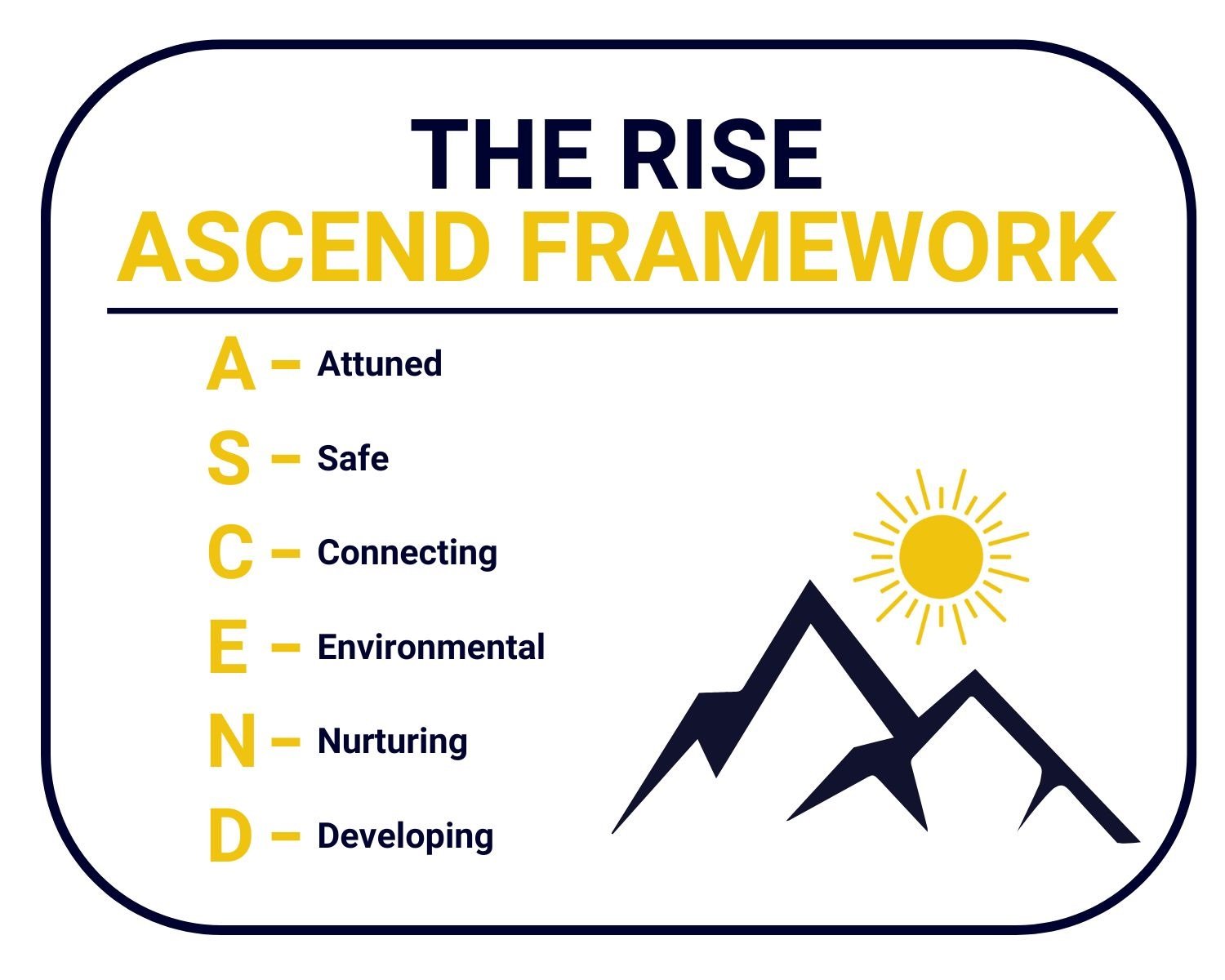
Our Approach
We’re about being there for young people by rising to any challenge.
The Rise approach builds resilience, empowerment and stability into the lives of children and youth by taking a personal approach to their needs, goals and dreams.
Creating change and making an impact through our ASCEND Framework.
Our integrated framework is designed to achieve outcomes in mental health, connections, physical health and learning and development.
ASCEND Framework:
-
Attunement refers to our ability to understand and identify the emotional needs of children, so we can respond appropriately by resonating and validating emotions and experience. Attuned adults assist a child or adolescent understand their emotions while supporting and teaching regulation skills. This pivotal role builds the pillars of safety and connection for young people and creates tools for a young person to manage their emotions.
To be an attuned caregiver we first need to be self-aware and attuned to own emotions, while understanding the impacts that trauma had on early childhood development/attachments, emotions/ behaviour. Self-awareness and trauma informed practice enables the care giver to form healthy, secure attachments while equipping young people with the necessary regulation skills to manage their emotions. Ensuring our clients feel seen, heard and understood is a focus at Rise.
-
Most children and youth that have experienced trauma and abuse have lost their sense of safety and are subsequently in a constant state of hyper arousal. This chronic stress response contributes to anxiety, depression, negative mental and physical health outcomes. If a young person feels safe it reduces anxiety so they can relax and attend to normal developmental tasks.
The aim when working with clients that have been exposed to complex trauma is to create an environment that is emotionally and physically safe. This is achieved through providing young people with a structured, predicable, responsive and culturally sensitive environment. If the young person is safe and feels safe; they can meet developmental milestones, heal, grow and ultimately recover from trauma.
-
Young people who have suffered from chronic trauma can often struggle with forming and maintaining connections due to trust issues, not feeling safe, fear of intimacy, and avoiding vulnerability. A growing body of research indicates that healthy relationships help mitigate the negative impacts of trauma and increase life expectancy. Furthermore, connections are crucial for creating a positive self-image, self-esteem, and a sense of belonging.
When working with clients exposed to complex trauma, a focus is assisting our clients with building healthy and secure relationships so they feel safe, develop trust, and form a secure attachment. Furthermore, at Rise, we understand the importance of children and youths connections and work on developing and strengthening each individual client’s relationship with their culture, community, peers, and family to improve social development and a client’s sense of belonging. Building healthy attachments with clients, teaching social skills, and working closely with cultural connections and families assist clients exposed to trauma with important skills and resources to heal.
-
The physical and cultural environment of a young person impacts the way they live and decisions they make. It is crucial for a caregiver to be cognizant of a child or adolescents behaviour and wellbeing through the lens of the physical and culture environment. A healthy environment is likely to produce positive outcomes and optimise a young person’s success. If an environment is chaotic, it is likely to produce negative outcomes for the individual.
The physical environment and culture for a young person that has been exposed to trauma needs to be individualised, safe, developmentally focused, stimulating, homely and clean. The culture at Rise is one of client centered care, with a focus on learning, development and healing. At Rise we create an environment that feels homely, safe and where the young person contributes to the decision that impact them and actively participates in the physical and cultural environment of the program.
-
Young people that enter care have often had their needs not met which has cause insecure attachments, impulsivity, issues with intrapersonal relationships, inability to regulate emotions, substance abuse, personality disorders, anxiety disorders and other metal health issues. The impact of having unmet needs can be life long and lead to a lower life expectancy.
To remedy our client’s attachment issues and subsequent impacts; we provide a caring environment that is responsive to the individual needs of each client. This is achieved through ensuring our clients have a homely environment, good health, nutrition, security, learning opportunities. Furthermore, we understand the importance of having staff that are invested, responsive and present to meet the needs of our clientele. Through being nurturing we can ensure our clients feel secure and thrive.
-
At Rise we focus on teaching our clients developmentally appropriate skills and provide opportunities for our clients to learn, practice and grow. Through our strength-based and goal orientated approach we can support our clients and build their capacity so they can thrive as adults. We are motivated to achieve outcomes with our clients through being intentional and actively working with our clients to achieve their goals. Our behaviour management strategies, routines and programming are all designed with an intention to achieve outcomes. Through deliberation, intention and developing our clients' skills we can create a climate of preventative management that optimises learning and development to those we serve.
The ASCEND Framework helps improve mental health outcomes, builds connections, teaches life skills, improves health outcomes and provide a path for successful educational and career opportunities.

